Grand National Winners 1840 – 1849
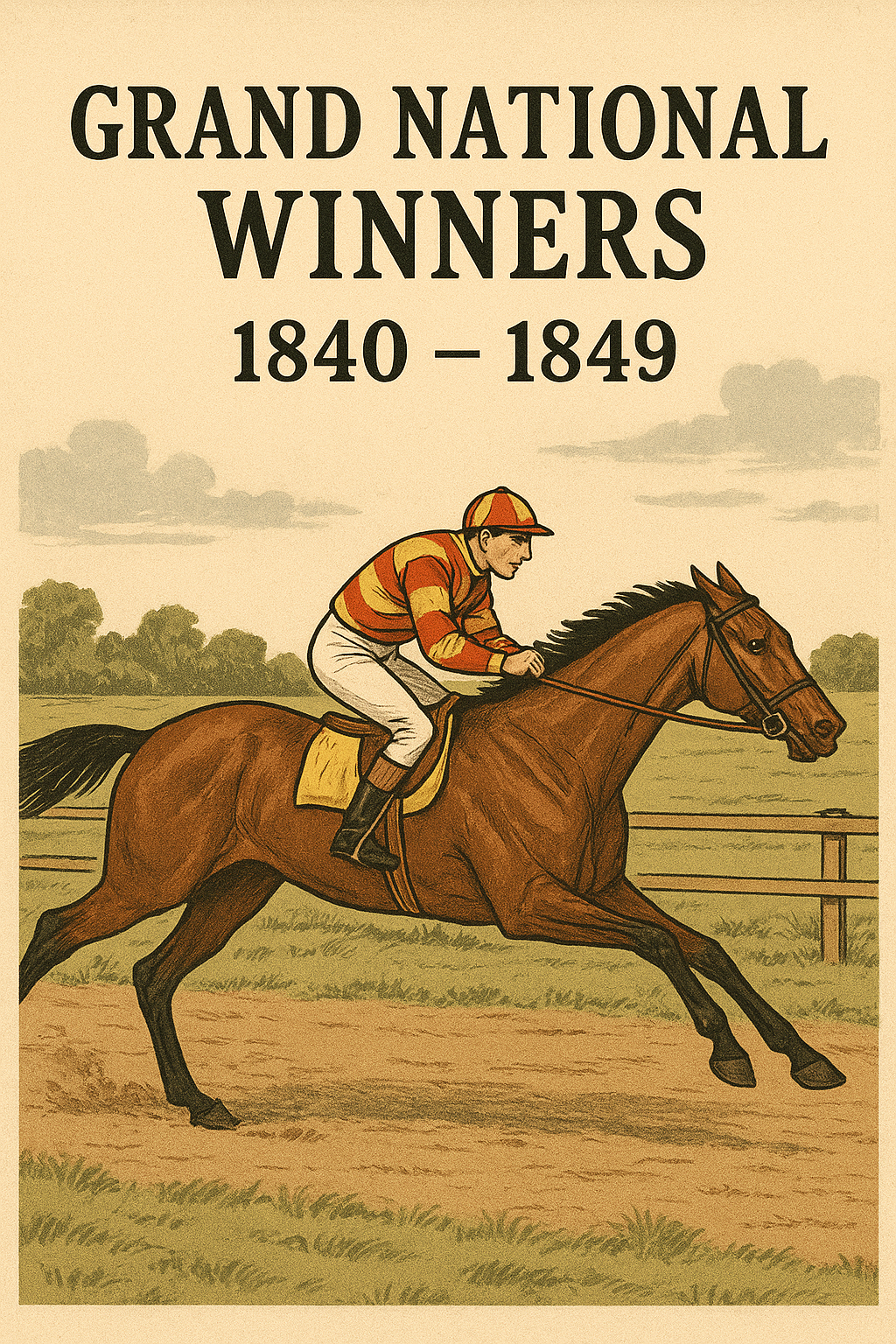 The Industrial Revolution saw urbanisation intensify. Cities grew rapidly but for the poorest, housing and sanitisation remained inadequate. Workhouses reflected the harsh realities for many. Outbreaks of Cholera took their toll on public health. Huge investment added to ‘Railway Mania’ which peaked mid-decade transforming society. Queen Victoria got married to Prince Albert in 1840. The British Empire expanded. China was humiliated with their loss in the First Opium War, which saw them concede much in The Treaty of Nanking 1842. It was called a ‘Century of Humiliation’ which saw Hong Kong Island ceded to Britain. New Zealand became a British colony in 1840. Expansion continued in Africa and India. However, closer to home the Great Famine (Potato Famine) devastated Ireland with repeated crop failures. Over 1 million died and another million emigrated (mainly to the United States). The British Government were criticised for their inadequate or indifferent relief policies. With an emphasis on free trade, The Bank Charter Act (1844) regulated bank note issuance. The Victorian culture of respectability, family and duty held strong. Charles Dickens published major works including A Christmas Carol (1843).
The Industrial Revolution saw urbanisation intensify. Cities grew rapidly but for the poorest, housing and sanitisation remained inadequate. Workhouses reflected the harsh realities for many. Outbreaks of Cholera took their toll on public health. Huge investment added to ‘Railway Mania’ which peaked mid-decade transforming society. Queen Victoria got married to Prince Albert in 1840. The British Empire expanded. China was humiliated with their loss in the First Opium War, which saw them concede much in The Treaty of Nanking 1842. It was called a ‘Century of Humiliation’ which saw Hong Kong Island ceded to Britain. New Zealand became a British colony in 1840. Expansion continued in Africa and India. However, closer to home the Great Famine (Potato Famine) devastated Ireland with repeated crop failures. Over 1 million died and another million emigrated (mainly to the United States). The British Government were criticised for their inadequate or indifferent relief policies. With an emphasis on free trade, The Bank Charter Act (1844) regulated bank note issuance. The Victorian culture of respectability, family and duty held strong. Charles Dickens published major works including A Christmas Carol (1843).
The Aintree Grand National saw a decade of winners.
Although detailed as the Grand Liverpool Steeplechase much of the press recorded it for the first time as the Grand National.
These early races were very disorganised but developed into the steeplechase we know and love today.
Let’s take a closer look:
1840 – Jerry 12/1
1841 – Charity 14/1
1842 – Gaylad 7/1
1843 – Vanguard 12/1
1844 – Discount 5/1
1845 – Cure-All (Not Quoted)
1846 – Pioneer 20/1
1847 – Mathew 10/1
1848 – Chandler 12/1
1849 – Peter Simple 20/1
1840: Jerry won the 2nd running of the Grand National, although until 1847 it was called The Grand Liverpool Steeplechase. This race featured a field of just 13 runners. It should be noted that it wasn’t a handicap as all horses carried 12 stone. Jerry won at odds of 12/1. Ridden by Mr Bartholomew Bretherton, trained by George Dockeray in the ownership of Henry Villebois. The gelding was meant to run the year before, but was withdrawn at the last minute. He won in a canter, beating the previous course record. The race was criticised as it was feared Tom Oliver had been killed by his fall, when brought down at the wall. He suffered a broken collar bone and concussion. Another jockey P. Barker had been found unattended in a nearby barn and connections had made no inquiries about his state.
1841: Noted for being the smallest field with just 11 runners. Charity, an eleven-year-old gelding, won at odds of 14/1. Trained by William Vevers, ridden by Horatio Powell in the ownership of Lord Craven, formerly Viscount Uffington. Race reports varied wildly with some newspapers suggesting Charity was a pre-race favourite while other said the going varied from good to heavy. The race started two hours late. Charity won by a length.
1845: Cure-All is something of a mystery in that he was a half-bred and his dam was unknown. Amazingly, he was walked from Grimsby to Liverpool and returned the same way after his noted victory. In their honour, church bells rang.
Cure-All won by two lengths.
William Loft, son of a Grimsby MP, originally purchased the horse at Horncastle Fair in 1843. He went on to win impressively at Lincoln. Thereafter, he was approached by William Stuart Sterling Crawford who wished to lease Cure-All for the 1845 Grand National, which Loft agreed as long as he could take the ride. He was trained by ‘Kitty’ Crisp.
In reality, William Loft owned, trained and rode the horse.
The gelding was an outsider (perhaps the reason there were no odds quoted). Sterling Crawford complained about the race conditions which had seen heavy rain followed by a sharp frost which saw parts of the course rock hard. Horse owners voted for the race to start at 5pm. However, Crocus, owned by Mr Robson, was withdrawn on safety concerns.
In those days, only the first four horses to pass the post were recorded as finishers. Some of the other runners to finish were so far behind they crossed the line with spectators.
Sadly, Clansman was fatally injured at the Canal Turn.
In years to follow, Tom Oliver detailed that Cure-All’s victory was due to not completing the entire course.
1849: Peter Simple won his first National at the age of 11 for owner-trainer Tom Cunningham in the ownership of Finch Mason Jr at odds of 20/1. He would win once more in 1853 at the age of 15. A feat that will never be beaten.
The oldest horse to ever win the Aintree Grand National.
Sadly, 3 horses were fatally injured (The Curate, Equinox & Kilfane.) There was a great deal of criticism regarding the horse deaths which had seen 6 horses fatally injured in two years. This would lead to modifications of the course.
A point considered to this day.
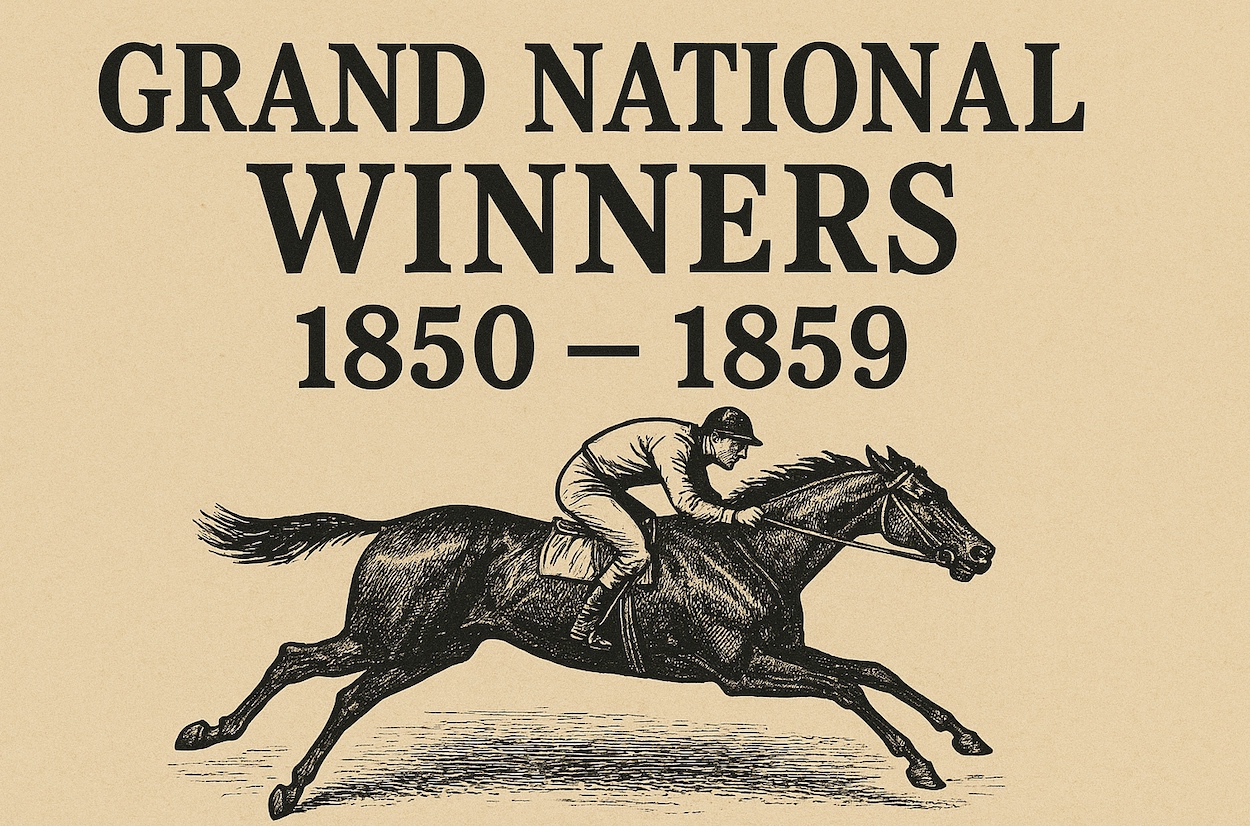 The height of the Victorian era.
The height of the Victorian era.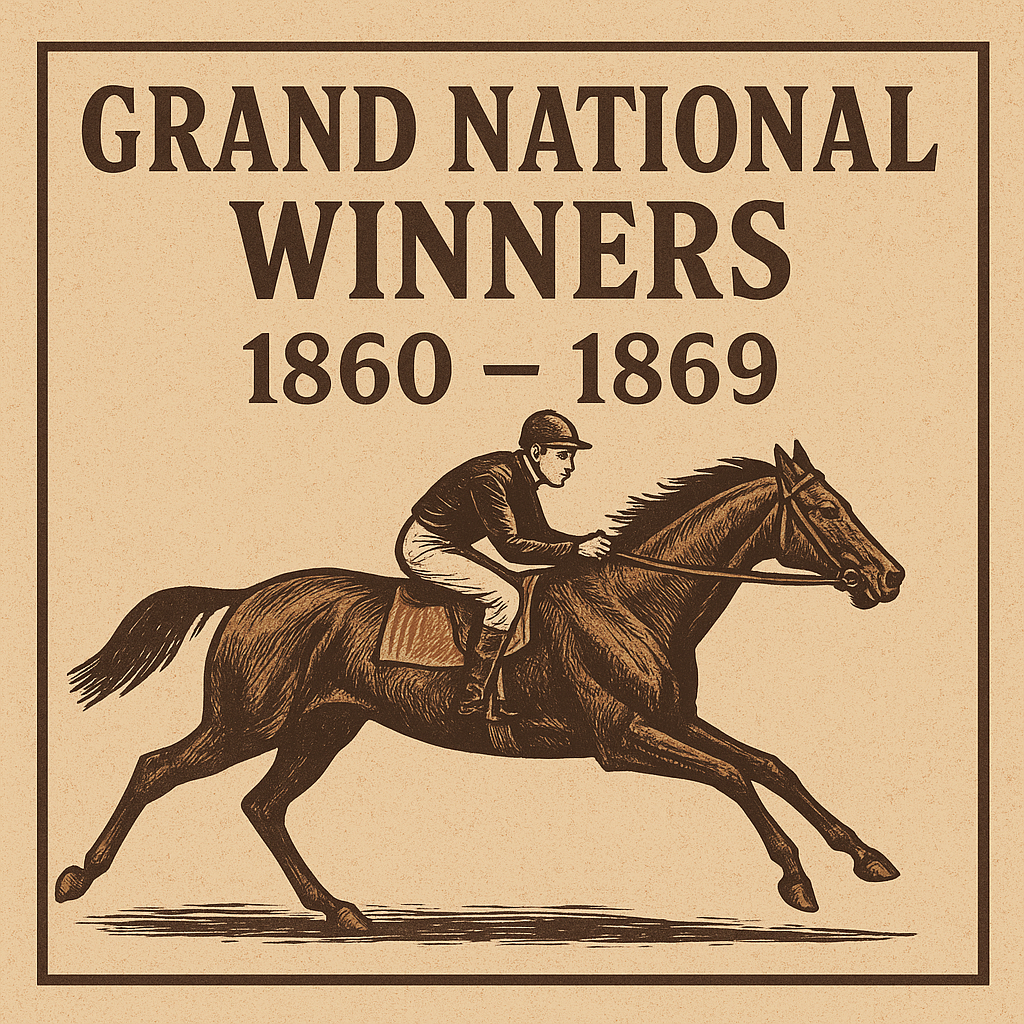 The death of Prince Albert in 1861 saw Queen Victoria dress in black for the rest of her life. Lord Palmerston, a Liberal, was Prime Minister from 1859 until his death in 1865. Campaigns for expanding voting rights would see increased numbers with the passing of the Second Reform Act (1867) under the Conservative rule of Benjamin Disraeli. Many urban working-class men voted for the first time. Cities grew, railways expanded and steel and coal production increased. The American Civil War (1861 – 1865) cut off cotton supplies from southern states hitting Lancashire’s textile industry leading to unemployment and hardship. The British Empire grew steadily in India and Africa, while troops were involved in colonial conflict with the Maori (1860 – 1869). Charles Darwin’s On the Origin of Species (1859) continued to spark debate. Britain was the hub of innovation. In 1863, London opened the world’s first Underground railway from Paddington to Farringdon. The work of Charles Dickens Great Expectations (1861) was well received both critically and by public alike. Modern sports like football and cricket become more formalized. The Aintree Grand National saw an enthralling decade of winners. It was a place where aristocrats rubbed shoulders with ordinary people.
The death of Prince Albert in 1861 saw Queen Victoria dress in black for the rest of her life. Lord Palmerston, a Liberal, was Prime Minister from 1859 until his death in 1865. Campaigns for expanding voting rights would see increased numbers with the passing of the Second Reform Act (1867) under the Conservative rule of Benjamin Disraeli. Many urban working-class men voted for the first time. Cities grew, railways expanded and steel and coal production increased. The American Civil War (1861 – 1865) cut off cotton supplies from southern states hitting Lancashire’s textile industry leading to unemployment and hardship. The British Empire grew steadily in India and Africa, while troops were involved in colonial conflict with the Maori (1860 – 1869). Charles Darwin’s On the Origin of Species (1859) continued to spark debate. Britain was the hub of innovation. In 1863, London opened the world’s first Underground railway from Paddington to Farringdon. The work of Charles Dickens Great Expectations (1861) was well received both critically and by public alike. Modern sports like football and cricket become more formalized. The Aintree Grand National saw an enthralling decade of winners. It was a place where aristocrats rubbed shoulders with ordinary people.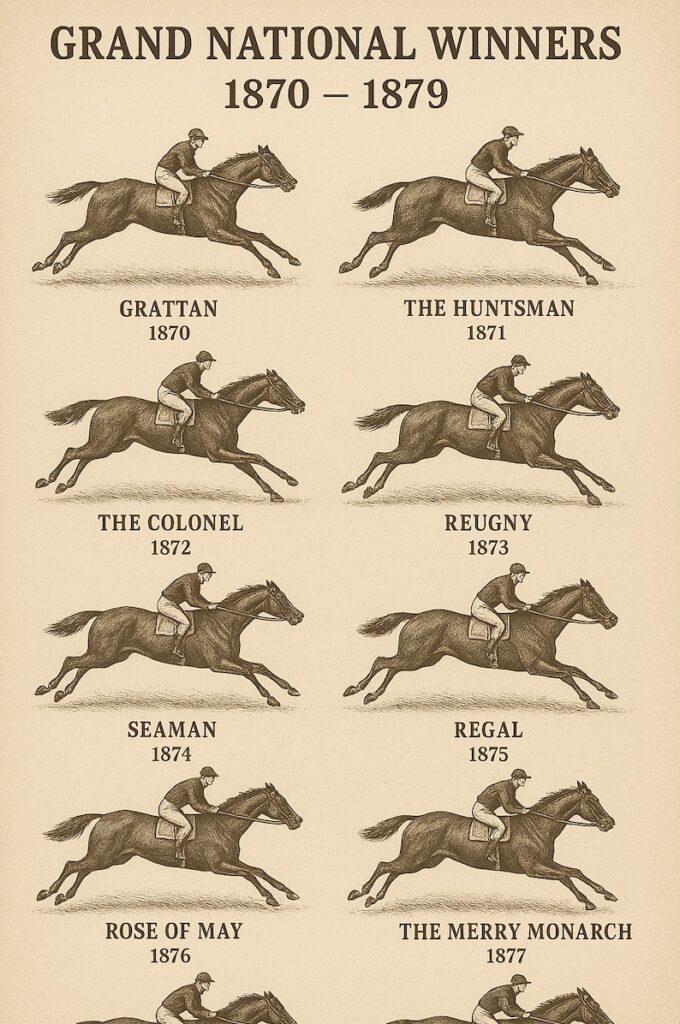
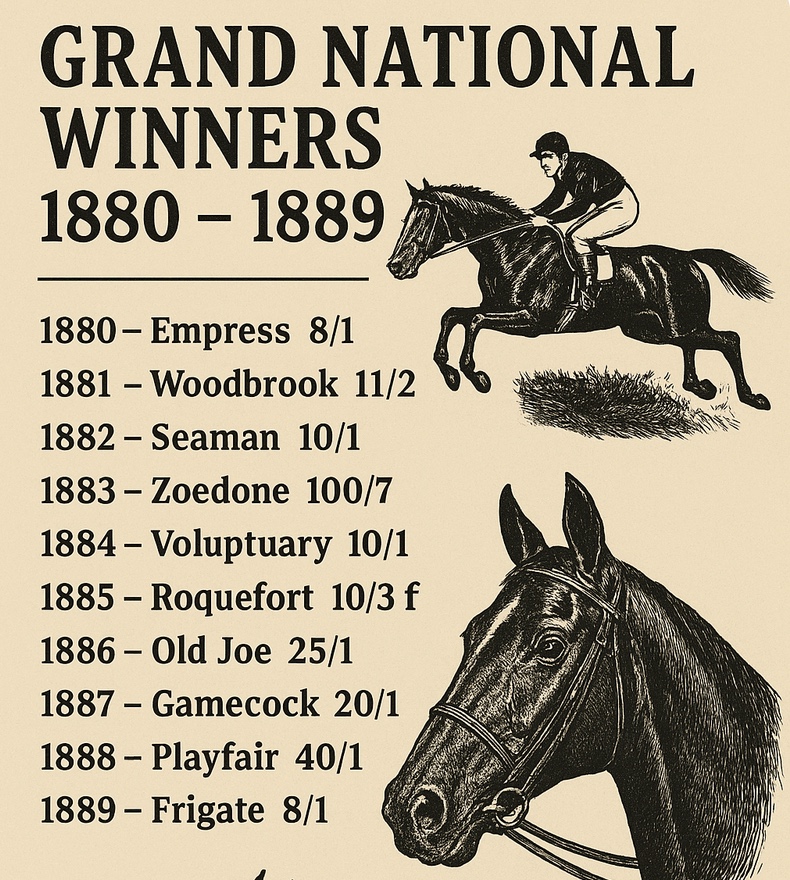 William Gladstone won the 1880 General Election, leading to over a decade of Conservative rule. This may have been helped by the 1884 Representation of the people Act which doubled the electorate by giving the vote to many rural working men. Britain expanded colonial rule in Egypt. In 1885, the public was shocked to hear General Charles Gordon was killed in the Sudan Crisis during the Mahdist uprising. The rise in new unionism saw the Matchgirls’ Strike (1888) highlighting labour conditions and workers’ rights. Elementary schools were more common and literacy rates rose. Oscar Wilde was popular within arts and literature. While Jack The Ripper lurked somewhere in the poverty-stricken streets of Whitechapel, London. The Married Women’s Poverty Act allowed married women to own property in their own right. Electricity and telephone uptake grew in the 1880s although it was only for business and wealthy individuals. At this time, betting was still done in person, on the street or on course.
William Gladstone won the 1880 General Election, leading to over a decade of Conservative rule. This may have been helped by the 1884 Representation of the people Act which doubled the electorate by giving the vote to many rural working men. Britain expanded colonial rule in Egypt. In 1885, the public was shocked to hear General Charles Gordon was killed in the Sudan Crisis during the Mahdist uprising. The rise in new unionism saw the Matchgirls’ Strike (1888) highlighting labour conditions and workers’ rights. Elementary schools were more common and literacy rates rose. Oscar Wilde was popular within arts and literature. While Jack The Ripper lurked somewhere in the poverty-stricken streets of Whitechapel, London. The Married Women’s Poverty Act allowed married women to own property in their own right. Electricity and telephone uptake grew in the 1880s although it was only for business and wealthy individuals. At this time, betting was still done in person, on the street or on course.